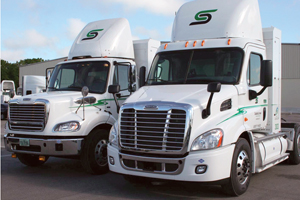Daimler Adds to Natural-Gas Buzz With New Truck Offerings

This story appears in the Aug. 5 print edition of Transport Topics.
YOUNTVILLE, Calif. — The paradoxical status of natural gas in the trucking industry was on vivid display here, as officials of the nation’s largest truck maker cited the fuel’s growing importance as an alternative to diesel and minimized its actual effect on the freight-hauling industry up to now.
Mark Lampert, senior vice president of sales and marketing for Daimler Trucks North America, told reporters that natural gas “is the most talked-about topic in trucking today,” but still represents less than 1% of trucks being sold in North America.
Despite those small sales, DTNA announced a series of additions to the company’s natural-gas offerings, including a new aerodynamics package for its Cascadia line of Class 8 natural-gas tractors.
Lampert also told reporters the company was sticking to its estimate that total North American truck sales in Classes 6-8 would reach around 330,000 in 2013. He said Class 8 will be down 5% to 7%, but Classes 6-7 sales will grow around 9%. He added that officials have pretty much given up hope that there will be a significant rise later in the year, since the economic recovery has not picked up much steam.
Lampert also said DTNA would reach its goals for the year, despite the flat sales growth, which are “to outperform the market and gain market share.”
Lampert said he expected that the company would end the year “with record market share,” but lower than its 39% share through June.
DTNA said it will begin offering a Cascadia 48-inch sleeper model with Cummins Inc.’s new 12-liter natural-gas engine this month, to supplement the existing Cascadia and M2 day cabs.
Officials said they also will put the 12-liter engine in the 113-inch aerodynamic day cab, which will offer a model featuring fuel tanks that are completely enclosed under fairings to boost fuel efficiency by reducing drag.
This truck resulted from a request by DTNA’s biggest natural-gas customer, Saddle Creek Logistics Services, of Lakeland, Fla.
Saddle Creek already runs 108 Freightliner natural-gas tractors, making it “the largest adopter of natural gas in over-the-road trucking,” said Mike DelBovo, president of Saddle Creek Transportation, its trucking subsidiary.
Saddle Creek already has placed orders for the first 10 of the new cabs, which will have engines that produce 400 horsepower and 1,450 pound-feet of torque. The new fairings will cover redesigned fuel tanks that will fit within the cab’s profile better than existing tanks, which protrude beyond the cab.
DelBovo said the company currently runs 104 compressed natural gas-powered Freightliners primarily in the Southeast, delivering freight for some of the nation’s largest retailers. It also runs four liquefied natural gas models in California.
Daimler said Saddle Creek is planning to buy 90 more day cabs after testing the first 10 in actual service. In all, Saddle Creek’s fleet is currently 430 tractors and 1,400 trailers.
The new trucks will have tankage equal to 120 gallons of diesel. DelBovo said that would give them a range of 700 miles, which the company needs in order to maximize the trucks’ value to the fleet. He said the trucks cost about 40% more than comparably equipped diesel vehicles.
DelBovo also said the company earns back the increased cost through lower fuel expenses in 50 months, based on a national diesel average price of $3.85.
He said the company is planning to run its natural-gas trucks for 10 years, in part because of the uncertainty surrounding the resale value.
DelBovo added that the natural-gas trucks emit 30% fewer emissions than diesel units and are one-tenth as loud. As a result, he said, his company has been granted waivers to noise regulations in some cities, which allows Saddle Creek to make deliveries in the late evening or early morning.
Bob Carrick, who heads DTNA’s natural-gas vehicles division, said fuel availability remains the biggest constraint on the expansion of natural-gas trucks.
And he cautioned that natural gas is not the answer for a large portion of the trucking industry, which can be expected to continue relying on diesel as its mainstay. Natural-gas trucks are heavier, due to the strong fuel tanks required, and do not have the range of diesels at this point.
David Hames, DTNA’s general manager of marketing and strategy, said the company has sold 2,700 natural-gas vehicles since 2008, the most of any North American truck maker. He also said DTNA is the only one adding natural-gas fuel tanks to trucks on the assembly line, rather than shipping them off to third-party suppliers. This cuts delivery times, he said, and improves the warranty that is extended to customers.




